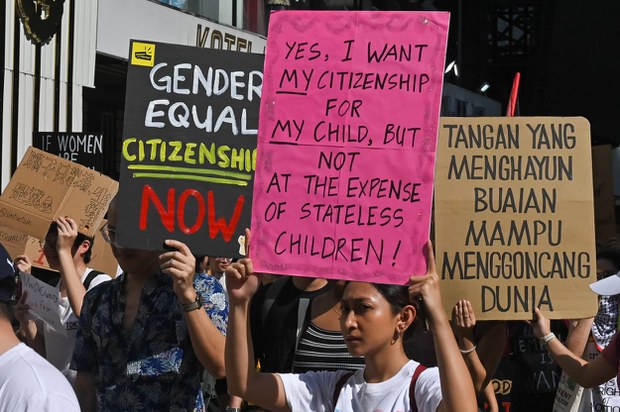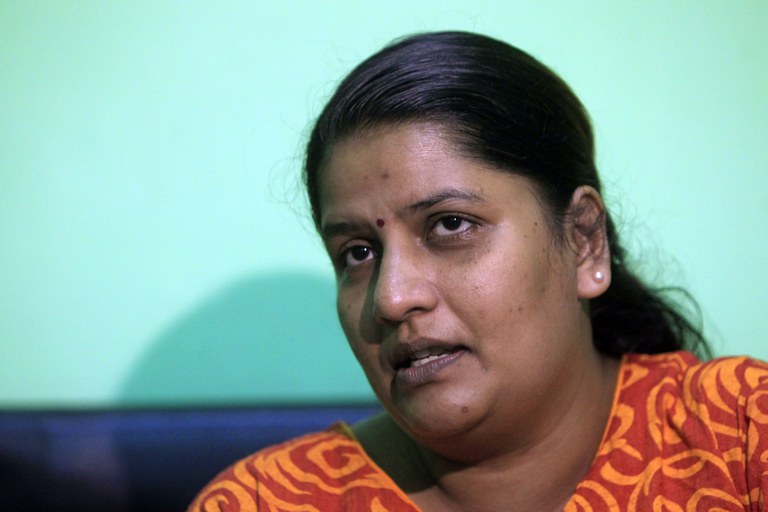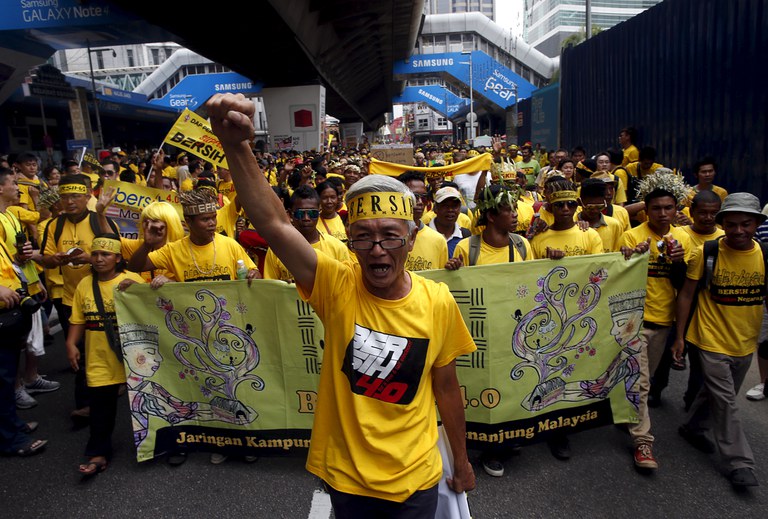Malaysia’s new citizenship law maintains regressive measures
2024.10.25
 A woman holds up a placard to protest against a proposed amendment to Malaysia’s citizenship laws as she participates in Women’s March MY 2024, in Kuala Lumpur, March 9, 2024.
A woman holds up a placard to protest against a proposed amendment to Malaysia’s citizenship laws as she participates in Women’s March MY 2024, in Kuala Lumpur, March 9, 2024.
Last week Malaysia passed a new Constitutional amendment correcting a gender discriminatory measure that denied citizenship to children born to Malaysian mothers overseas.
Malaysian fathers whose children were born abroad always had that right, which had been denied to mothers. Now children born overseas to both Malaysian women and men can become citizens.
The legislation was portrayed as a reason to celebrate. Indeed, for mothers, it corrects a long-standing injustice.
The other amendments and details of the legislation, however, suggest the opposite.
Anwar Ibrahim’s government packed the legislation with measures that increase statelessness, extend gender discrimination, and harm children, especially from minority and vulnerable communities.
The associated amendments to the Constitution are among the most regressive in Malaysian history, curtailing the ability to address the serious problem of more than 1 million undocumented persons in the country, including over 100,000 undocumented children born in Malaysia.
Rather than give citizenship to more people, the new legislation takes it away from individuals.
First of all, the provisions related to mothers whose children are born overseas, do not apply retroactively. This leaves the thousands of children born to Malaysian mothers overseas before the bill’s passage without legal protections to acquire Malaysian citizenship.
Activists advocating for equality of citizenship laws highlighted the anguish of families divided by the inability to live as a unit and the discrimination faced by siblings born overseas who are denied the same rights and access to public education, health care and other services.
Children born overseas to Malaysian mothers have also faced psychological harm, been branded as unworthy and excluded in the country’s society. These families and children will continue to suffer.
Regressive measures
One of the new amendments also target women, bringing back gender discrimination.
The government can now revoke the citizenship of foreign spouses of Malaysian men if their marriage ends within two years of their citizenship application, rather than within two years of the marriage itself.
The measure expands the power of the Malaysian government to control the citizenship status of foreign wives. This leaves women in abusive marriages and children from the marriage highly vulnerable.
Women in Malaysia in abusive marriages have disproportionately received little support from Malaysian authorities.
The case of M. Indira Gandhi whose daughter was abducted by her ex-husband in 2009 is illustrative.
Authorities failed to issue an arrest warrant on the father to return their daughter to the mother’s custody despite multiple court orders, including a landmark decision by the Federal Court in 2018.
A civil suit against the police claiming they were acting in bad faith by supporting the husband was dismissed last July. She has not seen her daughter for over fifteen years.
There are concerns that the new citizenship amendments give additional leverage to abusive men to hold over their spouses.

To make matters worse, the amendments make it more difficult for children to apply for citizenship by reducing the age limit for applying, to 18 years old from 21.
Given that applications take on average five years for review, this limits the ability of children to address issues in the review process.
Clearly, one of the aims of the legislation was to reduce pathways to citizenship, and in fact, to make them harder.
This most devastating measure involves the denial of citizenship for foundlings, orphans and children of permanent residents born in Malaysia.
This change will particularly impact children of the indigenous Orang Asli communities, whose lack of proper citizenship documentation reflects endemic neglect of this community.
Other minorities, such as the Indians and the ethnic communities in Borneo, face similar exclusion. The bill’s anti-minority overtones have created considerable disquiet.
Growing statelessness problem
Worryingly, these amendments add to the already serious problem of statelessness, and make solutions to it more difficult.
The primary reason these measures denying citizenship for foundlings and permanent residents’ children were included in the legislation stems from 40 years of mismanagement of migration in the state of Sabah.
From the 1980s, migrants were brought in to marginalize the political influence of local ethnic minorities and to strengthen the political position of the federal government under what was called Project IC, one of the darkest projects of the tenure of the former Prime Minister Dr. Mahathir Mohamad.
Not only did Project IC change the demography of Sabah, it also left a horrible legacy.
Now, over an estimated 1 million people, including around 100,000 children, without proper documentation live in desolate poverty, and are denied public education and health care.
They are subject to greater labour exploitation and abuse than most others as they try to eke out a precarious living. And with multiple generations condemned to repeat this cycle, they have been condemned to a life of criminality and marginality.
At the same time, undocumented persons are deeply resented by indigenous communities that have been politically displaced. They are also demonised as they are perceived as adding to Sabah’s border security problems.

This issue remains emotive among Sabahans.
The legislation’s inclusion of amendments that target children was part of a compromise to ensure the support of enough politicians so the law could pass.
Tragically, the legislation targets and perpetuates statelessness for future generations.
Rather than work to undo the dark legacy of Mahathir’s Project IC in Sabah, Malaysia’s new citizenship legislation makes problems worse.
Beyond adding to the numbers of undocumented persons, targeting children creates another excluded generation that will tear at the fabric of Sabah society and be detrimental to the goal of sustainable development.
When civil society began to push for changes in the citizenship law, the aim was to expand citizenship, especially for children and families.
Malaysia’s regressive new measures do not do this.
Many in Malaysian civil society are devastated by how the legislation was hijacked to curtail rights.
The bill was an opportunity to correct injustices. Instead, Anwar Ibrahim’s government has widened them.
An independent researcher, Bridget Welsh is an honorary research associate at the Asia Research Institute of University of Nottingham Malaysia in Kuala Lumpur and a Senior Associate Fellow of The Habibie Center. The views expressed here are her own and do not reflect the position of the University of Nottingham Malaysia, The Habibie Center or BenarNews.







